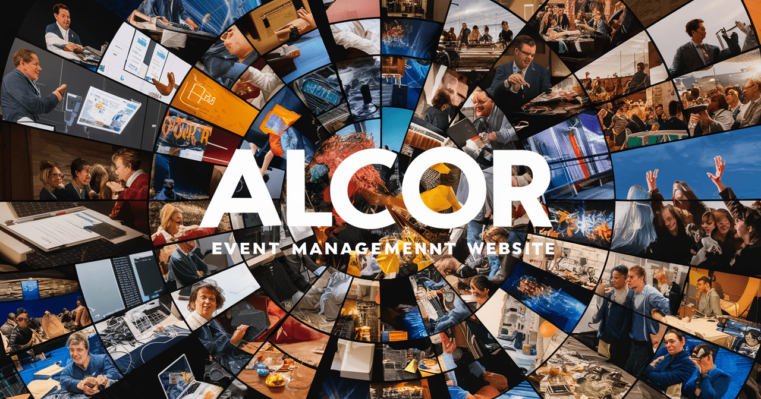Event management has become an increasingly complex and demanding task in today's fast-paced world. With the rise of digital technology, there has been a shift towards online event planning and management. One of the key components of a successful event is having a well-designed and functional event management website. In this article, we will explore why an event management website is essential for a successful event and how it can make the entire process easier and more efficient.
The Benefits of Using an Event Management Website
An event management website offers numerous benefits to both event planners and attendees. Let's take a closer look at some of these benefits:
Streamlined Registration Process
Gone are the days of manual registration forms and long queues at event check-ins. With an event management website, attendees can easily register and purchase tickets online, making the process quicker and more convenient. This not only saves time for event planners but also makes it easier for attendees to secure their spot at the event.
Automated Communication
Communication is a crucial aspect of event planning and management. An event management website allows for automated communication through email or SMS, keeping attendees informed about important updates and details such as event schedules, speakers, and venue information. This helps to reduce any confusion or last-minute changes that may occur.
Easy Access to Event Information
An event management website serves as a central hub for all event-related information. Attendees can easily access details such as event agendas, speaker bios, session descriptions, and venue maps. This eliminates the need for physical handouts and reduces paper waste, making it a more sustainable option as well.
Simplified Payment Options
With an event management website, attendees can conveniently pay for tickets and registrations online using various payment methods, including credit cards, PayPal, and other digital wallets. This eliminates the need for attendees to carry cash or checks on the day of the event, making the entire process more seamless and hassle-free.
Real-Time Data Tracking
Event planners can track real-time data and analytics through an event management website. This provides valuable insights into attendee behavior, ticket sales, and other important metrics that can help in making informed decisions for future events. It also allows for quick adjustments to be made during the event itself, such as adding or changing session times based on attendance numbers.
Enhanced Marketing Opportunities
An event management website offers a platform for effective event marketing. With features such as social media integration, email marketing, and customizable event pages, event planners can reach a wider audience and create a buzz around their event. This can lead to increased ticket sales and overall event success.
How to Use an Event Management Website
Using an event management website is a relatively simple process, but it requires careful planning and attention to detail. Here are some key steps to follow when using an event management website:
1. Choose the Right Platform
There are many event management platforms available in the market, each with its own unique features and pricing options. It's crucial to choose a platform that suits your specific event needs and budget. Some popular options include Eventbrite, Cvent, and Bizzabo.
2. Set Up Your Event Page
Once you have selected your platform, it's time to set up your event page. This includes adding all relevant event details, such as date, time, location, and ticket prices. You can also customize your page with branding elements and add promotional content to attract attendees.
3. Enable Registration and Ticket Sales
Next, you will need to enable registration and ticket sales on your event page. This involves setting up ticket types, pricing, and payment options. Make sure to offer different ticket options to cater to various attendee needs, such as early-bird discounts or VIP packages.
4. Promote Your Event
Now that your event page is live, it's time to start promoting your event. Utilize the various marketing features offered by your platform, such as email campaigns and social media integration, to reach a wider audience. You can also collaborate with speakers and sponsors to further promote your event.
5. Monitor Registrations and Analytics
As registrations come in, it's important to regularly monitor the data and analytics provided by your platform. This will give you valuable insights into attendee behavior and help you make any necessary adjustments or improvements for future events.
Examples of Successful Event Management Websites
- TEDx Event Management Website: The website for TEDx events follows a simple yet effective design, with all the necessary information easily accessible to attendees. It also offers a user-friendly registration process and features engaging content to build excitement for the event.
- SXSW Event Management Website: The South by Southwest (SXSW) event management website stands out for its visually appealing design and use of interactive features, such as a schedule builder and session recommendations based on attendee interests.
- Dreamforce Event Management Website: The Dreamforce event management website showcases the power of effective event marketing through its use of bold graphics and promotion of key speakers and sessions. It also offers a seamless registration process and detailed event information.
Comparing Different Event Management Platforms
There are numerous event management platforms available, each with its own unique features and pricing options. Here are some factors to consider when comparing different platforms:
- Pricing: Some platforms charge a flat fee, while others may take a percentage of ticket sales. Consider your budget and choose a platform that offers the best value for money.
- Features: Make a list of the features you require for your event and compare them across different platforms. Look for features such as email marketing, social media integration, and real-time data tracking.
- User experience: A user-friendly platform is essential for both event planners and attendees. Look for platforms with intuitive interfaces and easy navigation.
- Customer support: In case of any issues or questions, it's important to have reliable customer support from the event management platform. Look for platforms that offer 24/7 support and have a good reputation for customer service.
Tips and Advice for Using an Event Management Website
- Start early: It's crucial to start planning and setting up your event management website well in advance to allow for any unexpected delays or technical difficulties.
- Keep things simple: While it may be tempting to include every detail and feature on your event page, it's important to keep it clean and organized. Too much information can overwhelm attendees, so stick to the essentials.
- Test the registration process: Before launching your event page, make sure to test the registration and ticket sales process to ensure it runs smoothly and there are no technical glitches.
- Utilize social media: Social media is a powerful tool for promoting your event and engaging with attendees. Make use of hashtags, post updates, and encourage attendees to share their experiences on social media.
- Gather feedback: After your event, gather feedback from attendees through surveys or other means. This will help you improve future events and make necessary changes to your event management website.
FAQs about Event Management Websites
Q: Do I need a website for my event if I already have a social media page?
A: While having a social media presence is important for event promotion, a dedicated event management website offers a centralized and professional platform for all event-related information and registrations.
Q: Can I customize my event page on an event management platform?
A: Yes, most event management platforms offer customization options such as branding and adding promotional content to your event page.
Q: Are there any hidden costs associated with using an event management platform?
A: Some platforms may charge additional fees for certain features, so it's important to carefully review pricing options before selecting a platform.
Q: Can event management platforms handle large-scale events?
A: Yes, most event management platforms are equipped to handle events of all sizes. However, it's important to choose a platform that can cater to your specific needs and has experience handling similar events.
Q: Is it possible to track attendance and check-ins through an event management website?
A: Yes, most event management platforms offer features for tracking attendance and checking attendees in at the event itself.
Conclusion
In today's digital age, an event management website is an essential tool for planning and executing successful events. From simplifying the registration process to offering marketing opportunities and real-time data tracking, an event management website offers numerous benefits for both event planners and attendees. By following the tips and advice provided in this article, you can use an event management website effectively and make your next event a resounding success.





